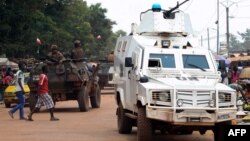A Democratic Republic of Congo official says the country is taking seriously allegations that several of its soldiers deployed as peacekeepers in the Central African Republic committed rape. The United Nations says the DRC battalion in the C.A.R. will be withdrawn and not replaced.
The Democratic Republic of Congo has a battalion of about 800 soldiers and 123 police officers with the U.N. mission in the Central African Republic, known as MINUSCA. Last August three soldiers in that battalion were accused of raping three female civilians, including one minor.
The DRC justice minister said at the time the allegations would be investigated.
UN investigating
This month, the U.N. said it is investigating new allegations of sexual abuse of minors by peacekeepers.
It is not clear how important the rape allegations are in the U.N. decision the DRC troops should withdraw from the Central African Republic. U.N. officials have said the troops failed an internal assessment based on equipment, vetting procedures and preparedness.
But in an interview with VOA, the DRC president’s personal representative charged with the fight against sexual violence, Jeanine Mabunda Lioko Mudiayi, linked the decision to the allegations.
Mabunda says the DRC was informed by the United Nations that a decision had been taken on the withdrawal of the DRC contingent from MINUSCA following rape allegations against certain soldiers in that unit.
She says the DRC has taken strong measures in recent months in response to those allegations.
Violence against women
Mabunda says the DRC brought 20 soldiers back to Kinshasa. Their cases are being examined and the 20 are at the Ndolo military prison, she says, adding that this shows how seriously the DRC regards questions of violence against women, particularly where security forces are concerned.
VOA asked what stage has been reached in the enquiry into the rape allegations. Mabunda says the process is ongoing and must go through stages.
“We must not put on a show trial,” she says. "The rights of defendants must not be trampled on, although certainly these are atrocious, ignoble charges.”
The DRC’s justice system can be trusted, Mabunda insists.
Since the bureau was created 18 months ago, she says, “the DRC’s institutions have shown they are capable of striking hard when rape cases are brought before them, and when those are cases are proved.”
A number of DRC soldiers have been convicted of sexual offenses in the past 18 months, including a general and a colonel.




